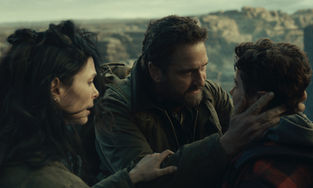'Passing' Review: Tessa Thompson & Ruth Negga In Rebecca Hall's Thoughtful Directorial Debut
- S.J.

- Dec 9, 2021
- 2 min read
Updated: Nov 3, 2023

Things aren't always what they seem on the surface in director-writer Rebecca Hall's debut film Passing, which she has adapted from Nella Larsen's novel of the same name. That title refers to acts of our main characters, Irene/''Rene'' (played by Tessa Thompson) and Clare (Ruth Negga), both whom are African-American women living in the 1920s who run into each other at a hotel in New York City for the first time in years, having gone to school together previously. Both are now married, have kids and are light-skinned enough to ''pass'' as a white person to different extents in the segregated society, the difference being in that Clare presents as white to live along with her unaware husband John (Alexander Skarsgård), rather than only sometimes like Irene. Two of them reconnecting inspire both of them to investigate their identities and advantages as well as disadvantages of passing.
Larsen's book and therefore Hall's script both have a thought-provoking premise to work with where, if adapted with care, there's a lot to dig through as far as the characters and themes go. Hall wisely relies on that intrigue as she surrounds Irene and Clare with affection despite the conflict between them which comes from how they decide to present themselves. Thompson and Negga also convey that duality beautifully in their performances, the former especially with subtle glances which can have different meanings depending on who's watching and with scenes between her and André Holland (playing Irene's husband Brian) where disagreements often have to be read between the lines. Despite the small sets and limited scope in locations, Hall also gets her actors moving and interacting enough to create a sense of urgency when needed.
DoP Eduard Grau's camera work in the tight 4:3 ratio compliments Nora Mendis' production design as they keep period details in check while perhaps struggling with the budget sometimes. Nevertheless, Passing always looks the part and you never feel the distance between current and past times. One of the things that didn't translate as well from the novel is the film's ending which feels anti-climactic since the editing, character arcs, musical score and the overall impact aren't performing as a team, almost like we're skipping frames just to get to the final ascending shot. Thematically it also plays weirdly as so much of the wreckage is then brought by an outsider in terms of screen time; patient beginnings don't deserve hurried closures after all.
Smileys: Tessa Thompson, characterisation, screenplay, Ruth Negga
Frowneys: Ending
Pass me another one of these but with a different ending.










